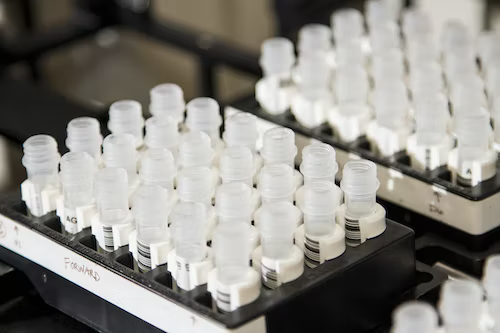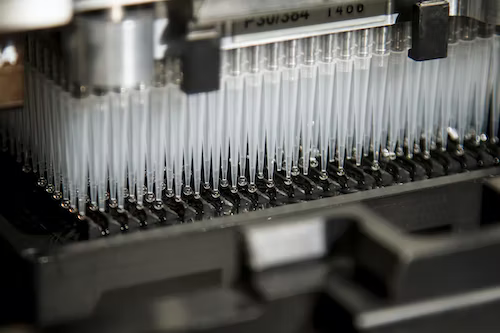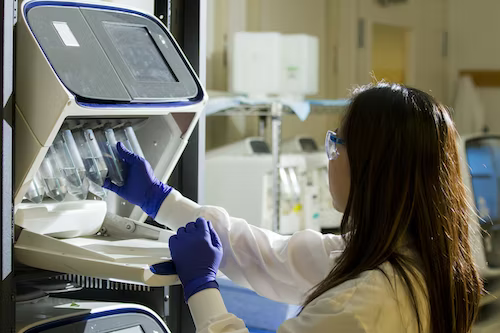Gene synthesis produces probes for the life science industries and is essential to molecular biology. These sectors include the development of drugs, vaccines, gene therapy, tissue substitutes, human genomes, and better food nutrition.
A few decades ago, one molecule at a time was all that could be modified using traditional genetic techniques. But next-generation sequencing services provided by companies specializing in custom gene synthesis enable the manufacture of recombinant, mutant, and new DNA.
The foundation for gene synthesis services, including peptide synthesis, protein synthesis, antibody synthesis, and sequencing, is gene synthesis. Gene synthesis can be used to create genes that don’t exist in nature. This gives people the ability to change organisms into an entirely new generation.
What is Gene Synthesis?
Gene synthesis involves creating an artificial DNA sequence, usually by joining smaller fragments of DNA, to produce a helpful gene. With this method, genes that do not exist in nature can be created or altered for particular uses.
The desired DNA sequence is assembled during gene synthesis utilizing chemical or biological techniques, such as the polymerase chain reaction. In comparison, biological methods use enzymes to copy and connect DNA fragments. Chemical synthesis uses automated machinery to assemble small DNA fragments into longer sequences.
Once the necessary DNA sequence has been created, it is used for other genetic engineering tasks. Alternatively, the DNA sequence can be introduced into a host cell to produce a genetically modified organism.
Gene synthesis has numerous uses in biotechnology. It is used to make recombinant proteins, investigate how genes work, produce vaccines and gene therapies, and modify crops to have specific properties.
Gene Synthesis Use in Biotechnology
- Antibody Production
The ability to produce antibodies is the main application of gene synthesis in biotechnology. Antibody manufacturing comprises the creation of antigens that are vaccinated into a host to develop target antibodies. Although antibody formation is natural, gene synthesis provides several advantages, including preventing side effects and host toxicity.
Second, recombinant genes have improved features such as more robust antibody specificity and a lower likelihood of E-coli protein aggregation. Bespoke antibody services for monoclonal antibody sequencing and polyclonal antibody manufacturing begin with gene synthesis. Also, gene sequencing reduces the cost of bespoke antibody sequencing for monoclonal antibodies.
Moreover, gene synthesis is essential in antibody manufacturing because it allows the generation of genes that encode the variable sections of antibodies. They are also referred to as V genes. These V-genes can be joined with constant domain genes to form an antibody gene. Then, they can be expressed in cells to make antibodies.
Antibodies with the appropriate characteristics can be found and chosen using the vast libraries of V genes. Gene synthesis offers a powerful technique for antibody production that can allow the development of superior, personalized antibodies.

- Recombinant Protein Production
Gene synthesis is a common technique for creating DNA sequences that code for proteins with altered or new functionalities. Production of recombinant proteins involves numerous steps. It features elements such as:
- Antibody Production Service
- Service for protein expression
- service for antibody sequencing
- synthesis of specific antibodies.
The origin of the procedures mentioned above and the steps for protein purification’s solid phase techniques are gene synthesis. To change a protein’s activity, stability, and specificity, synthetic genes can be engineered to carry particular mutations, deletions, or insertions. High throughput approaches are also used in the manufacture of recombinant proteins for the following reasons:
- Produce top-notch proteins
- manufacture of specific antibodies for drug discovery
- genetic engineering to ensure food security
- Therapeutics
- Gene Therapy
Gene synthesis produces synthetic gene material as nucleic acid sequences as base pairs. Researchers can use gene synthesis services to refine or modify genetic components. As a result, the target gene’s properties or qualities are enhanced for usage as probes in numerous live sciences research initiatives.
In biotechnology, gene synthesis is employed for gene therapy. Gene therapy develops modified genes that can be administered to patients to rectify genetic flaws or treat diseases. The synthetic genes in gene therapy are then engineered to produce therapeutic proteins, tiny RNA molecules, or gene-editing tools.

- Vaccine Development
Gene synthesis expedites vaccine development. Vaccines against infectious diseases can be developed more quickly using synthetic genomes that encode viral proteins. This is one of the main reasons gene synthesis is extensively used in biotechnology.
Furthermore, synthetic genes can construct epitope libraries for assessing immune responses and finding prospective vaccine targets. Researchers can use gene synthesis to synthesize DNA sequences encoding potential vaccination candidates quickly. This significantly shortens the vaccine development schedule, allowing researchers to design and test vaccine candidates more quickly.

- Functional Genomics
Gene synthesis produces vast amounts of DNA sequences for functional genomics research. Certain properties of synthetic genes, such as restriction enzyme sites or reporter genes, make downstream analysis easier.
Furthermore, gene synthesis enables the production of mutant genes with particular DNA sequence modifications. As a result, it is feasible to explore the consequences of individual mutations on gene function. Gene synthesis can make chimera genes, which incorporate parts from different genes by analyzing how they connect.
With developments in gene synthesis technology, massive sets of genes may now be synthesized in an elevated manner. This allows researchers to look into the activity of gene families or processes, providing a complete picture of gene function.
Conclusion
Gene synthesis transformed biotechnology by allowing researchers to create optimal genes to enhance people’s lives within and outside medical disciplines. Synthetic genes generate massive gene products for the agriculture, cleaning, and food manufacturing industries. As a result, gene synthesis is the future of biotechnology. Researchers are constantly developing new strategies to make the procedure more cost-effective and productive.
Read: TOP 5 Trending Kitchen Gadgets
Pranay, a coding maestro weaving digital magic with Dot Net,Angular. With 4+ years in web development,he specialize in crafting seamless solutions. Beyond coding, Pranay is a wordsmith, passionate about sharing insights through guest posts. Whether crafting code or narratives, he bring creativity and precision to every project. Connect to explore his coding journey and delve into the world where tech meets storytelling .follow us on X

